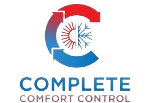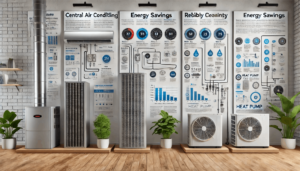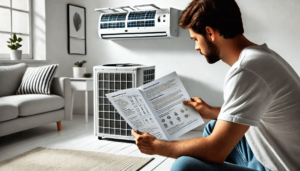Introduction
When it comes to maintaining a comfortable home throughout the year, the importance of a reliable heating and cooling system cannot be overstated. Whether it’s keeping cool during the sweltering heat of summer or staying warm in the dead of winter, having a system that adapts to every season is crucial. This is where the concept of Four Seasons Heating and Cooling comes into play.
Designed to provide year-round comfort, Four Seasons Heating and Cooling systems are tailored to efficiently manage the temperature and air quality in your home, regardless of the external climate. From energy-saving features to advanced air filtration systems, these units ensure you’re prepared for whatever nature throws your way. In this guide, we’ll walk you through the essentials of these systems, how they work, and the benefits of investing in one for your home.
Wouldn’t it be nice to enjoy consistent comfort in your home through all four seasons? Keep reading to learn why this type of HVAC system could be your ideal solution.
Understanding Four Seasons Heating and Cooling
A Four Seasons Heating and Cooling system refers to an HVAC setup designed to maintain comfort in your home throughout the year, regardless of outdoor temperature fluctuations. It takes into account the different climate demands of each season—whether it’s freezing cold in the winter or hot and humid in the summer. These systems are engineered to regulate indoor temperature, humidity, and air quality with optimal efficiency, making them an excellent choice for homeowners looking for consistent comfort and cost-effectiveness.
What Is Four Seasons Heating and Cooling?
A Four Seasons Heating and Cooling system is an all-encompassing solution that combines heating, cooling, ventilation, and air purification into one efficient system. It operates through heat pumps, furnaces, or a combination of heating and cooling units that adapt to seasonal changes. In the winter, the system delivers consistent warmth through forced air, radiant heat, or other methods. In the summer, it provides cooling via air conditioners, heat pumps, or ductless mini-split systems.
Unlike single-purpose systems, a Four Seasons setup is integrated to handle varying temperatures and humidity levels, making it perfect for regions with significant seasonal changes. The goal is to provide continuous comfort while keeping energy consumption low, using smart thermostats and energy-efficient technologies to adjust operation based on the needs of each season.

Why Four Seasons Matter in HVAC Systems?
Seasonal changes bring different challenges for HVAC systems. In winter, heating systems need to counteract cold outdoor temperatures and low humidity, ensuring the indoor environment is warm and comfortable. In summer, air conditioning is crucial to maintain a cool and dehumidified indoor space, combating the heat and humidity outside.
The transitional seasons, spring and fall, often require a balance between heating and cooling, especially in areas where temperatures can swing dramatically within a day. A Four Seasons Heating and Cooling system adjusts seamlessly to these changes. It knows when to provide mild heat in the mornings and switch to cooling by the afternoon. This adaptability makes it an essential option for homes in regions with diverse climates.
By addressing the demands of all four seasons, this HVAC system ensures that your home remains comfortable, no matter the weather outside. Whether it’s using heat pumps to efficiently manage both heating and cooling, or advanced air filtration systems to keep indoor air clean, Four Seasons systems are engineered to tackle the unique challenges that each season presents.
Benefits of a Four Seasons Approach for Your Home
One of the main benefits of a Four Seasons system is energy efficiency. Since these systems are designed to handle both heating and cooling, they minimize the need for multiple standalone systems, reducing energy consumption and operating costs. Many Four Seasons systems come with programmable or smart thermostats, enabling homeowners to optimize energy usage by adjusting settings based on the time of day, weather, or season.
Another advantage is enhanced indoor air quality. These systems often include advanced filtration and ventilation features that help remove dust, pollen, and other airborne contaminants. This is particularly beneficial for households with allergies or asthma, as cleaner air contributes to overall health and well-being.
Four Seasons systems also offer zoned heating and cooling, allowing different areas of the home to be controlled independently. This feature ensures that energy is only used where and when it’s needed, improving overall efficiency and comfort. Additionally, these systems provide long-term cost savings, as their energy-efficient technology reduces the frequency of repairs and the costs associated with fluctuating utility bills.
Finally, Four Seasons systems can increase the resale value of your home. Prospective buyers are often willing to pay more for homes equipped with high-quality, energy-efficient HVAC systems, knowing that it ensures comfort throughout the year and reduces ongoing costs.
Key Features of a Four Seasons HVAC System
When it comes to home comfort, a Four Seasons Heating and Cooling system is designed to ensure that your home remains comfortable throughout the year, regardless of external temperature changes. These systems integrate advanced technology and high-efficiency features to provide seamless heating, cooling, and air quality management. Whether it’s a sweltering summer day or a freezing winter night, a Four Seasons HVAC system ensures consistent indoor conditions. Let’s dive into the key features that make this type of system a great choice for year-round comfort.
Energy Efficiency and Year-Round Comfort
One of the most appealing features of a Four Seasons HVAC system is its emphasis on energy efficiency. Modern HVAC systems are designed to meet stringent energy standards, ensuring that they not only keep your home comfortable but also minimize energy consumption. These systems use innovative technologies such as variable-speed compressors, two-stage heating, and energy-efficient heat pumps to adjust output based on the specific needs of the home.
For instance, in the winter, the system operates at a lower capacity when moderate heating is needed and ramps up during extreme cold, effectively managing energy consumption. In the summer, energy-efficient air conditioning units keep your home cool without excessive energy use, especially if the system includes smart thermostats that learn your preferences and automatically adjust settings based on the time of day, weather conditions, or occupancy levels.
Energy-efficient HVAC systems not only reduce your carbon footprint but also save you money on monthly utility bills. Over time, the energy savings from using a Four Seasons system can be substantial, making it a long-term investment that delivers both environmental and financial benefits.
Temperature Control in Every Season
The primary goal of a Four Seasons Heating and Cooling system is to maintain ideal indoor temperatures throughout the year, no matter what the weather is doing outside. These systems excel in providing precise temperature control, ensuring your home remains warm in the winter and cool in the summer. A common feature of these systems is zoned temperature control, which allows homeowners to control the temperature in different areas or zones of the house independently.
For instance, if you spend most of your time in the living room during the day, you can set the system to heat or cool that specific zone, while using less energy to condition other parts of the house. In the evening, you can shift focus to the bedroom, ensuring comfort while you sleep. This level of control is particularly beneficial for homes with multiple levels or large square footage, as it prevents wasting energy in unused areas.
Zoning systems are designed to be user-friendly, and when paired with smart thermostats, they can be programmed remotely via mobile apps, providing maximum convenience. This feature allows homeowners to manage their indoor climate efficiently, whether they are at home or away.

Indoor Air Quality for All Seasons
Another standout feature of Four Seasons HVAC systems is their ability to enhance indoor air quality (IAQ), ensuring that the air you breathe is clean and healthy, regardless of the season. Poor indoor air quality can contribute to a range of health issues, such as allergies, respiratory conditions, and general discomfort. HVAC systems designed for year-round use often incorporate advanced filtration, ventilation, and humidity control features to address these concerns.
For instance, during the winter, homes tend to have dry air, which can lead to discomfort, skin irritation, and respiratory problems. A Four Seasons system can include humidifiers to maintain optimal humidity levels, improving comfort and health. In the summer, when outdoor allergens like pollen are prevalent, high-efficiency particulate air (HEPA) filters or MERV-rated filters trap airborne contaminants, reducing allergens and dust inside the home.
Additionally, these systems often include ventilation solutions that bring fresh air into the home without compromising energy efficiency. This is particularly important for homes that are tightly sealed for energy conservation, as it ensures that indoor air remains fresh and oxygen-rich while removing contaminants like carbon dioxide, pet dander, and volatile organic compounds (VOCs).
With features such as UV air purifiers, dehumidifiers, and whole-house ventilation systems, Four Seasons HVAC units offer an all-in-one solution to maintaining high indoor air quality in every season, providing year-round health benefits to your household.
Choosing the Right Four Seasons Heating and Cooling Provider
When it comes to selecting the right provider for your Four Seasons Heating and Cooling system, it’s essential to make an informed choice. The right provider will ensure that your system is installed, maintained, and serviced professionally, ensuring long-term performance and reliability. In this section, we’ll explore key factors to consider, such as certifications, customer reviews, and service packages that will guide you toward choosing the best HVAC provider for your needs.
Checking Certifications and Licensing
One of the most important factors when choosing a Four Seasons Heating and Cooling provider is ensuring they are properly certified and licensed. HVAC systems are complex and require professional handling. A licensed provider guarantees that the technicians working on your system have undergone the necessary training and adhere to industry standards.
A licensed company will have technicians certified by organizations such as NATE (North American Technician Excellence) or HVAC Excellence, which are highly regarded in the industry. These certifications demonstrate that the technicians possess the skills and knowledge to install, repair, and maintain Four Seasons systems correctly. This is particularly important because improper installation can lead to inefficiencies, higher energy bills, and even potential safety hazards.
Additionally, certifications like EPA (Environmental Protection Agency) Section 608 ensure that the technicians are qualified to handle refrigerants safely, which is crucial for cooling systems. When vetting a provider, always request proof of their licenses and certifications to verify their qualifications.
Reading Customer Reviews and Testimonials
Before making a final decision, it’s essential to evaluate the reputation of the provider. Customer reviews and testimonials offer valuable insights into the experiences of other homeowners who have worked with the company. These reviews provide a realistic understanding of the company’s strengths and weaknesses and help you determine whether they deliver high-quality service.
Online review platforms such as Google Reviews, Yelp, and BBB (Better Business Bureau) are excellent resources for this. Look for providers with consistently positive feedback, but also pay attention to how they handle negative reviews. A reputable company will respond professionally to concerns and take steps to resolve issues. This shows that they prioritize customer satisfaction and are committed to improving their services.
In addition to online reviews, ask the provider for references from previous customers. Speaking directly with past clients allows you to gather firsthand accounts of their experiences, providing additional reassurance before you commit.
Comparing Service Packages and Warranties
Another important aspect of choosing the right Four Seasons provider is comparing their service packages and warranties. The best HVAC companies offer comprehensive packages that include installation, regular maintenance, and emergency repair services. This ensures that your Four Seasons system is well-maintained and performing optimally year-round.
Some companies offer maintenance plans that cover seasonal tune-ups and inspections, which are essential for preventing breakdowns and extending the life of your system. It’s worth investing in these plans to avoid costly repairs down the line. Be sure to ask about what’s included in these packages and how they can be customized to suit your specific needs.
Warranties are also a critical factor when comparing providers. A manufacturer’s warranty typically covers parts and equipment, while a service warranty covers the labor associated with repairs or replacements. Ensure the provider you choose offers solid warranty coverage, and that the terms are clear and comprehensive. Some companies provide extended warranties, which offer additional protection beyond the standard coverage period.
Finally, it’s important to understand the provider’s policy on after-sales support. HVAC systems can encounter issues at any time, so having access to 24/7 emergency repair services is a valuable feature. Confirm that your chosen provider offers prompt and reliable service when you need it most.
Maintenance Tips for Four Seasons HVAC Systems
Proper maintenance is essential to keep your Four Seasons Heating and Cooling system running efficiently throughout the year. Seasonal changes bring different demands on your HVAC system, and regular upkeep can prevent costly repairs, improve energy efficiency, and extend the system’s lifespan. In this section, we’ll cover a comprehensive seasonal maintenance checklist, preventive steps for winter and summer, and when it’s necessary to call in a professional HVAC technician.
Seasonal HVAC Maintenance Checklist
A well-maintained HVAC system is crucial for providing year-round comfort in your home. Here’s a seasonal HVAC maintenance checklist to ensure your system is in top condition:
- Inspect and Replace Air Filters: Air filters trap dust, dirt, and allergens, helping to maintain indoor air quality. Inspect them every month, and replace them every 1-3 months, depending on your usage and the type of filter. Dirty filters restrict airflow, making your system work harder and reducing energy efficiency.
- Clean Coils: The evaporator and condenser coils should be cleaned at least once a year. Over time, these coils collect dirt and debris, which reduces their ability to absorb heat. Cleaning them can improve cooling efficiency, especially during the summer.
- Check Thermostat Settings: Ensure your thermostat is calibrated correctly and set to the proper seasonal temperature. Programmable thermostats allow you to adjust the temperature based on your schedule, ensuring energy savings when the system isn’t needed.
- Inspect Ductwork and Vents: Check your home’s ductwork and air vents for leaks or blockages. Proper airflow is vital for maintaining even temperatures across your home. Leaky ducts can lead to energy loss, while blocked vents may cause the system to overheat.
- Lubricate Moving Parts: Regular lubrication of your HVAC system’s moving parts, like fan motors and belts, reduces friction and prevents wear and tear. Properly lubricated parts ensure your system operates quietly and efficiently.
- Check Refrigerant Levels: Low refrigerant can reduce your system’s cooling efficiency and damage the compressor. Ensure refrigerant levels are checked annually, especially before the summer cooling season.
Preventive Maintenance for Winter and Summer
Preventive maintenance for your Four Seasons HVAC system is especially critical before the extreme temperatures of winter and summer. Here are some seasonal tips to help you prepare:
Winter Maintenance:
- Furnace Check: Before winter hits, have a professional inspect your furnace to ensure it’s functioning correctly. A furnace inspection will involve checking burners, the heat exchanger, and ensuring proper airflow.
- Seal Gaps and Drafts: Check your windows, doors, and any other potential areas where cold air can enter your home. Sealing these gaps improves energy efficiency and reduces the strain on your heating system.
Summer Maintenance:
- Air Conditioning Inspection: Have a technician inspect your air conditioner before summer begins. They will check the refrigerant levels, clean the evaporator coils, and ensure the outdoor unit is free of debris. This ensures your system runs efficiently during the hotter months.
- Clean Outdoor Unit: Keep the area around your outdoor air conditioning unit clear of leaves, plants, and debris. This allows for better airflow and prevents the system from overheating.
When to Call for Professional HVAC Help
While regular maintenance can be handled by homeowners, there are situations when it’s best to call a professional HVAC technician. Knowing when to seek professional help can save you from costly repairs or system failures.
- Strange Noises: If your system is making unusual noises such as banging, squealing, or grinding, it’s a sign that something could be wrong with the motor, blower, or fan. These issues require professional attention to diagnose and repair properly.
- Inconsistent Temperatures: If certain rooms in your home are significantly warmer or cooler than others, it could indicate a problem with your ductwork, thermostat, or air distribution. A technician can assess and balance your system for optimal performance.
- Frequent Cycling: If your system is turning on and off frequently, it may be short cycling, which can be caused by issues such as an oversized system, a faulty thermostat, or low refrigerant levels. This issue not only reduces efficiency but can lead to unnecessary wear on your system.
- Increasing Energy Bills: A sudden spike in energy bills without a corresponding change in usage often indicates your system is working harder due to an underlying issue. A professional can troubleshoot and fix the problem to restore energy efficiency.
- Regular Tune-ups: Scheduling regular professional HVAC tune-ups is one of the best preventive measures you can take. A technician will inspect, clean, and adjust your system to keep it running smoothly throughout the year. It’s recommended to schedule a professional inspection twice a year — before the heating and cooling seasons begin.
Conclusion
Four Seasons Heating and Cooling systems offer year-round comfort and efficiency, making them an essential part of modern home climate control. By understanding the unique benefits of these systems, knowing how to choose the right provider, and maintaining your HVAC system properly, homeowners can ensure optimal performance and long-term savings. Whether you’re preparing for the winter chill or the summer heat, investing in a reliable Four Seasons system ensures that your home stays comfortable, energy-efficient, and cost-effective. With the right provider and maintenance plan in place, you’ll enjoy a seamless transition between seasons, keeping your home’s air quality and temperature in check throughout the year.
Resources
- Energy.gov. (n.d.). Heating and Cooling. https://www.energy.gov/heating-and-cooling
- Lennox. (n.d.). Heating and Cooling Systems Explained. https://www.lennox.com/
- EnergyStar. (n.d.). What Is an Energy Efficient HVAC System?
- https://www.energystar.gov/products/heating_cooling/energy_efficient_hvac_systems
- Carrier. (n.d.). HVAC Systems and Indoor Air Quality. https://www.carrier.com
- HVAC Excellence. (n.d.). Certification programs. https://www.hvacexcellence.org/
- Better Business Bureau (BBB). (n.d.). Find HVAC contractors. https://www.bbb.org/hvac
- U.S. Department of Energy. (n.d.). Maintain Your HVAC System. https://www.energy.gov/
- U.S. Department of Energy. (n.d.). Heating, Ventilation, and Air Conditioning. https://www.energy.gov/




